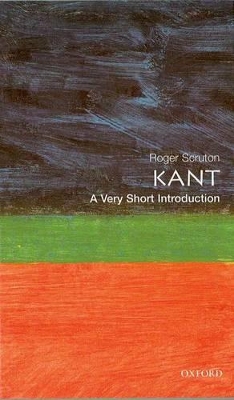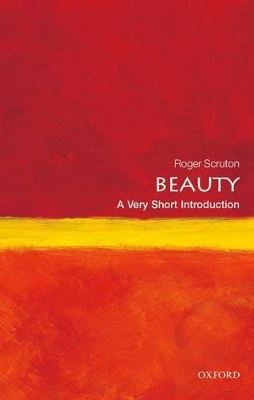Very Short Introductions
1 primary work • 3 total works
Book 50
Kant is arguably the most influential modern philosopher, but also one of the most difficult. Roger Scruton tackles his exceptionally complex subject with a strong hand, exploring the background to Kant's work and showing why the Critique of Pure Reason has proved so enduring.
ABOUT THE SERIES: The Very Short Introductions series from Oxford University Press contains hundreds of titles in almost every subject area. These pocket-sized books are the perfect way to get ahead in a new subject quickly. Our expert authors combine facts, analysis, perspective, new ideas, and enthusiasm to make interesting and challenging topics highly readable.
ABOUT THE SERIES: The Very Short Introductions series from Oxford University Press contains hundreds of titles in almost every subject area. These pocket-sized books are the perfect way to get ahead in a new subject quickly. Our expert authors combine facts, analysis, perspective, new ideas, and enthusiasm to make interesting and challenging topics highly readable.
Benedict de Spinoza (1632-77) was at once the father of the Enlightenment and the last sad guardian of the medieval world. In his brilliant synthesis of geometrical method, religious sentiment, and secular science, he attempted to reconcile the conflicting moral and intellectual demands of his epoch, and to present a vision of humanity as simultaneously bound by necessity and eternally free. In this book Roger Scruton presents a clear and systematic analysis of
Spinoza's thought, and shows its relevance to today's intellectual preoccupations.
ABOUT THE SERIES: The Very Short Introductions series from Oxford University Press contains hundreds of titles in almost every subject area. These pocket-sized books are the perfect way to get ahead in a new subject quickly. Our expert authors combine facts, analysis, perspective, new ideas, and enthusiasm to make interesting and challenging topics highly readable.
Spinoza's thought, and shows its relevance to today's intellectual preoccupations.
ABOUT THE SERIES: The Very Short Introductions series from Oxford University Press contains hundreds of titles in almost every subject area. These pocket-sized books are the perfect way to get ahead in a new subject quickly. Our expert authors combine facts, analysis, perspective, new ideas, and enthusiasm to make interesting and challenging topics highly readable.
Beauty can be consoling, disturbing, sacred, profane; it can be exhilarating, appealing, inspiring, chilling. It can affect us in an unlimited variety of ways. Yet it is never viewed with indifference.
In this Very Short Introduction the renowned philosopher Roger Scruton explores the concept of beauty, asking what makes an object - either in art, in nature, or the human form - beautiful, and examining how we can compare differing judgements of beauty when it is evident all around us that our tastes vary so widely. Is there a right judgement to be made about beauty? Is it right to say there is more beauty in a classical temple than a concrete office block, more in a Rembrandt than in
last year's Turner Prize winner?
Forthright and thought-provoking, and as accessible as it is intellectually rigorous, this introduction to the philosophy of beauty draws conclusions that some may find controversial, but, as Scruton shows, help us to find greater sense of meaning in the beautiful objects that fill our lives.
ABOUT THE SERIES: The Very Short Introductions series from Oxford University Press contains hundreds of titles in almost every subject area. These pocket-sized books are the perfect way to get ahead in a new subject quickly. Our expert authors combine facts, analysis, perspective, new ideas, and enthusiasm to make interesting and challenging topics highly readable.
In this Very Short Introduction the renowned philosopher Roger Scruton explores the concept of beauty, asking what makes an object - either in art, in nature, or the human form - beautiful, and examining how we can compare differing judgements of beauty when it is evident all around us that our tastes vary so widely. Is there a right judgement to be made about beauty? Is it right to say there is more beauty in a classical temple than a concrete office block, more in a Rembrandt than in
last year's Turner Prize winner?
Forthright and thought-provoking, and as accessible as it is intellectually rigorous, this introduction to the philosophy of beauty draws conclusions that some may find controversial, but, as Scruton shows, help us to find greater sense of meaning in the beautiful objects that fill our lives.
ABOUT THE SERIES: The Very Short Introductions series from Oxford University Press contains hundreds of titles in almost every subject area. These pocket-sized books are the perfect way to get ahead in a new subject quickly. Our expert authors combine facts, analysis, perspective, new ideas, and enthusiasm to make interesting and challenging topics highly readable.


